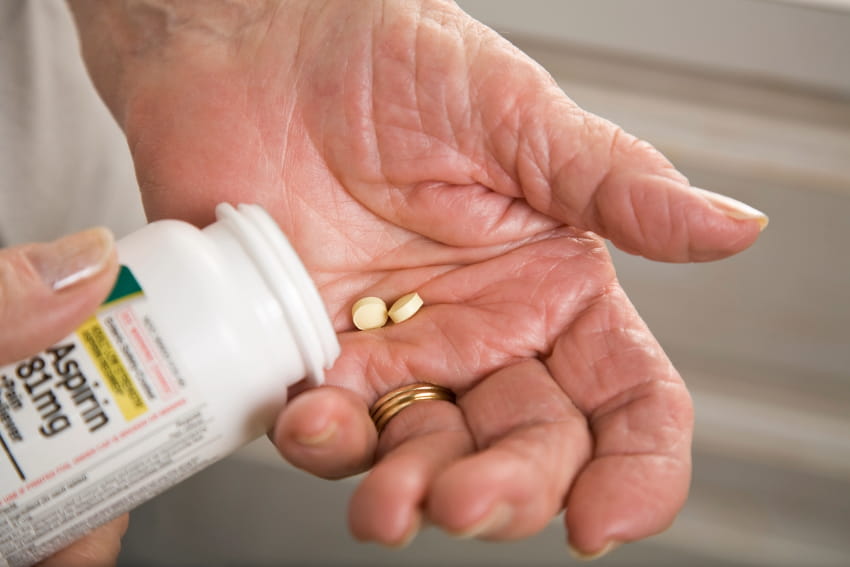Daily aspirin therapy: Do you know the benefits and risks?

Heart attacks and strokes are often scary, unknown possibilities in life. If you could lower your risk of having a heart attack or a stroke by taking a common, over-the-counter medicine every day, that may sound like an easy way to take back some control over your health. But is it really that straightforward?
For decades, taking a daily low-dose aspirin (you might have heard it called "baby" aspirin) was thought to be a simple way to keep heart attacks and strokes at bay for most adults. This practice is often called daily aspirin therapy, or an aspirin regimen.
More recent research, however, has led to new guidelines about who should be taking aspirin daily — and it's important to know that a daily aspirin regimen is not for everyone.
Here's what you should know about what aspirin does, the benefits and risks of daily aspirin therapy. And who can — and shouldn't — be taking aspirin daily.
What does aspirin do?
Aspirin is a medication that helps prevent swelling, fevers, pain and blood clots and is commonly used as a pain reliever.
Like any medication, aspirin can also have side effects. These include:
- Stomach pain
- Nausea/vomiting
- Heartburn
- Diarrhea
- Itching and/or a skin rash
What is a "baby" aspirin?
A standard aspirin pill contains 325 milligrams (mg) of medicine. The low-dose version, which is often informally called a "baby" aspirin, generally contains only 81 mg of medicine. Low-dose aspirin is the type most prescribed in the U.S. and is the kind typically taken for daily aspirin therapy.
Benefits of daily aspirin therapy
Aspirin is what's commonly known as a blood-thinner — it helps blood flow more easily through your arteries and veins.
"When your blood moves freely, you're less likely to develop blood clots — which are often the culprit in strokes and heart attack," says John Steers, MD, a cardiologist at Bryn Mawr Hospital, part of Main Line Health.
If you've already had a heart attack or stroke, or if you're at a higher risk for heart attack or stroke due to other risk factors, daily aspirin therapy may help prevent further clots.
Risks of daily aspirin therapy
Some aspirin pros can actually be cons in certain situations. Because aspirin prevents blood from clotting, daily aspirin therapy puts you at a greater risk of uncontrolled bleeding. Bleeding in your stomach and brain are particularly serious risks of daily aspirin therapy.
Because of this, you may need to stop or pause taking your daily aspirin before having surgery or certain dental procedures.
"Like with any drug, aspirin can interact with other medicines and supplements — including alcohol," says Dr. Steers. "It's important to tell your healthcare provider about any medications (including vitamins) that you take regularly to avoid unnecessary risks."
Be especially careful of daily aspirin therapy if…
Certain factors and underlying conditions make it dangerous for you to take low-dose aspirin daily. For example, if you have certain bleeding disorders, daily aspirin therapy is not advised.
Also, unless your provider has a specific reason for you to take it, you should avoid taking aspirin during pregnancy.
Finally, once you get to be about 75 years of age, the risks of daily aspirin outweigh the benefits.
Should I be taking aspirin daily?
You shouldn't start taking aspirin unless you've talked to your provider about whether daily aspirin therapy is a good option for you or not.
Research has shown that if you are between the ages of 40 to 59 years old and have a high risk of cardiovascular disease, you may benefit from daily aspirin therapy. Be sure to talk to your healthcare provider to see if you should be taking aspirin daily.
Am I at high risk of cardiovascular disease?
If you have had a heart attack or stroke before, or if you have coronary artery disease (narrowed blood vessels near your heart due to plaque build-up), you might be considered high-risk. As a result, your healthcare provider may prescribe daily low-dose aspirin.
Sometimes, even if you're considered high risk, the risks of daily aspirin therapy may outweigh the benefits. The most recent research recommends that beginning daily aspirin therapy should be based on each individual patient.
What's best for you: Daily aspirin therapy and beyond
Keeping your heart and brain healthy are primary health goals for most people. While it's tempting to try to ease many of your healthcare worries by simply taking a low-dose aspirin every day, the truth is that this practice will only benefit a select few who meet certain criteria.
If you're an adult between the ages of 40 to 59 years of age and you have already had a stroke or heart attack or are at increased risk of either, talk with your healthcare provider about a daily aspirin regimen. Together with a healthy diet and exercise, aspirin may benefit you.
However, even if you don't meet these guidelines, there are steps you can take to reduce your risk of heart disease and stroke. Eating a well-balanced diet, exercising regularly, not smoking and maintaining a healthy weight are achievable ways to improve your health and lower your risks of heart attack or stroke.
Next steps:
Make an appointment with John Steers, MD
Learn about heart and vascular care at Main Line Health
Is some exercise better than none?
 Content you want, delivered to your inbox
Content you want, delivered to your inbox
Want to get the latest health and wellness articles delivered right to your inbox?
Subscribe to the Well Ahead Newsletter.
